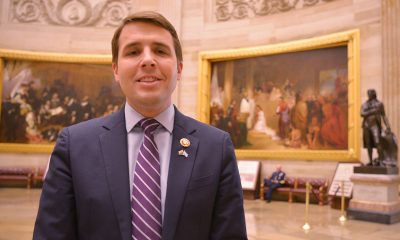Congress
Gay man wins Democratic congressional primary in Ill.
Eric Sorensen running for retiring U.S. Rep. Cheri Bustos’ seat

Illinois Democrats are hoping to send a gay person to Congress for the first time in the state’s history.
Voters in the 17th Congressional District in northwest Illinois on Tuesday voted to have Eric Sorensen, a former meteorologist, become the Democratic nominee for the district’s U.S. House of Representatives seat currently held by retiring Democratic Congresswoman Cheri Bustos.
“THANK YOU to everyone who was a part of this movement,” Sorensen wrote on Twitter following his primary victory. “From day one this campaign has been built on three pillars: Trust, science, and communication. I’m honored to be your #IL17 Democratic nominee for Congress.”
Sorensen, who bested his closest primary opponent by more than 13,000 votes, has centered much of his campaign messaging around the issue of mitigating the effects of climate change.
Sorensen’s candidacy and potential to become the state’s first openly gay member of Congress has been met with celebration from those advocating for more of such representation on Capitol Hill. After Sorensen claimed victory on Tuesday, advocacy groups and political organizations like Equality PAC and the LGBTQ Victory Fund were quick to offer their support.
“It has never been more important to defend our pro-choice, pro-equality majority in Congress,” Victory Fund President Annise Parker said in a statement. “As a meteorologist, Eric spent the last two decades keeping his local community safe by telling the truth and promoting a pro-science agenda. His success tonight is a testament to his continued leadership and grassroots support, as well as a highly effective ground game focused on candid conversations about how to make government work for all Americans.”
Hoping to keep the district from flipping to Republican control in a midterm year that is expected to be an uphill battle for Democratic congressional majorities, Sorensen has also gained the backing of the district’s current congresswoman. Bustos took to Twitter following Sorensen’s victory to announce her support.
“Illinoisans deserve a representative who will fight for working families, help build our local economy and continue to lift up Midwestern voices,” Bustos wrote. “Eric will do that.”
Sorensen’s ultimate ascension to Illinois’ 17th Congressional District seat, however, is not assured. Though the district leans Democratic, it is widely labeled as a competitive race following nationwide redistricting of congressional maps ahead of this year’s midterms.
Such a competitive landscape is coupled with a competitive rival battling Sorensen for the seat.
His Republican opponent, lawyer and Army Reserve Capt. Esther Joy King, previously ran for the seat in 2020, losing to Bustos by just four percent of the overall vote.
Having already secured a number of high-profile Republican endorsements including House Minority Leader Kevin McCarthy (R-Calif.), House Conference Chair Elise Stefanik (R-N.Y.) and former Secretary of State Mike Pompeo, King has already begun her November messaging campaign after besting her primary opponent by more than 30 percentage points.
“It doesn’t have to be a choice if we elect leaders who will put their constituents first rather than far-left, out-of-touch policies and that’s exactly what I’m running to do,” King said in a statement Tuesday night. “Let’s come together to win this in November.”
Groups like the Victory Fund, however, are remain optimistic that Sorensen’s potential to make history will be within reach when voters enter the polls on Nov. 8.
“Voters are clearly enthusiastic about Eric’s vision for a more equitable future,” Parker said. “We trust Eric will be a vital voice in Congress come November. The stakes have never been higher.”
Congress
Congress passes ‘Big, Beautiful Bill’ with massive cuts to health insurance coverage
Roughly 1.8 million LGBTQ Americans rely on Medicaid

The “Big, Beautiful Bill” heads to President Donald Trump’s desk following the vote by the Republican majority in the U.S. House of Representatives Thursday, which saw two nays from GOP members and unified opposition from the entire Democratic caucus.
To partially offset the cost of tax breaks that disproportionately favor the wealthy, the bill contains massive cuts to Medicaid and social safety net programs like food assistance for the poor while adding a projected $3.3 billion to the deficit.
Policy wise, the signature legislation of Trump’s second term rolls back clean energy tax credits passed under the Biden-Harris administration while beefing up funding for defense and border security.
Roughly 13 percent of LGBTQ adults in the U.S., about 1.8 million people, rely on Medicaid as their primary health insurer, compared to seven percent of non-LGBTQ adults, according to the UCLA School of Law’s Williams Institute think tank on sexual orientation and gender identities.
In total, the Congressional Budget Office estimates the cuts will cause more than 10 million Americans to lose their coverage under Medicaid and anywhere from three to five million to lose their care under Affordable Care Act marketplace plans.
A number of Republicans in the House and Senate opposed the bill reasoning that they might face political consequences for taking away access to healthcare for, particularly, low-income Americans who rely on Medicaid. Poorer voters flocked to Trump in last year’s presidential election, exit polls show.
A provision that would have blocked the use of federal funds to reimburse medical care for transgender youth was blocked by the Senate Parliamentarian and ultimately struck from the legislation — reportedly after the first trans member of Congress, U.S. Rep. Sarah McBride (D-Del.) and the first lesbian U.S. senator, Tammy Baldwin (D-Wis.), shored up unified opposition to the proposal among Congressional Democrats.
Congress
Ritchie Torres says he is unlikely to run for NY governor
One poll showed gay Democratic congressman nearly tied with Kathy Hochul

Gay Democratic Congressman Ritchie Torres of New York is unlikely to challenge New York Gov. Kathy Hochul (D) in the state’s next gubernatorial race, he said during an appearance Wednesday on MSNBC’s “Morning Joe.”
“I’m unlikely to run for governor,” he said. ““I feel like the assault that we’ve seen on the social safety net in the Bronx is so unprecedented. It’s so overwhelming that I’m going to keep my focus on Washington, D.C.”
Torres and Hochul were nearly tied in a poll this spring of likely Democratic voters in New York City, fueling speculation that the congressman might run. A Siena College poll, however, found Hochul leading with a wider margin.
Back in D.C., the congressman and his colleagues are unified in their opposition to President Donald Trump’s signature legislation, the “Big Beautiful Bill,” which heads back to the House after passing the Senate by one vote this week.
To pay for tax cuts that disproportionately advantage the ultra-wealthy and large corporations, the president and Congressional Republicans have proposed massive cuts to Medicaid and other social programs.
A provision in the Senate version of the bill that would have blocked the use of federal funds to reimburse medical care for transgender youth was blocked by the Senate Parliamentarian and ultimately struck from the legislation, reportedly after pressure from transgender U.S. Rep. Sarah McBride (D-Del.) and lesbian U.S. Sen. Tammy Baldwin (D-Wis.).
Torres on “Morning Joe” said, “The so-called Big Beautiful Bill represents a betrayal of the working people of America and nowhere more so than in the Bronx,” adding, “It’s going to destabilize every health care provider, every hospital.”
Congress
House Democrats oppose Bessent’s removal of SOGI from discrimination complaint forms
Congressional Equality Caucus sharply criticized move

A letter issued last week by a group of House Democrats objects to Treasury Secretary Scott Bessent’s removal of sexual orientation and gender identity as bases for sex discrimination complaints in several Equal Employment Opportunity forms.
Bessent, who is gay, is the highest ranking openly LGBTQ official in American history and the second out Cabinet member next to Pete Buttigieg, who served as transportation secretary during the Biden-Harris administration.
The signatories to the letter include a few out members of Congress, Congressional Equality Caucus chair and co-chairs Mark Takano (Calif.), Ritchie Torres (N.Y.), and Becca Balint (Vt.), along with U.S. Reps. Nikema Williams (Ga.), Hank Johnson (Ga.), Raja Krishnamoorthi (Ill.), Delia Ramirez (Ill.), Joyce Beatty (Ohio), Lloyd Doggett (Texas), Eleanor Holmes Norton (D.C.), Josh Gottheimer (N.J.), and Sylvia Garcia (D-Texas).
The letter explains the “critical role” played by the EEO given the strictures and limits on how federal employees can find recourse for unlawful workplace discrimination — namely, without the ability to file complaints directly with the Employment Opportunity Commission or otherwise engage with the agency unless the complainant “appeal[s] an agency’s decision following the agency’s investigation or request[s] a hearing before an administrative judge.”
“Your attempt to remove ‘gender identity’ and ‘sexual orientation’ as bases for sex discrimination complaints in numerous Equal Employment Opportunity (EEO) forms will create unnecessary hurdles to employees filing EEO complaints and undermine enforcement of federal employee’s nondiscrimination protections,” the members wrote in their letter.
They further explain the legal basis behind LGBTQ inclusive nondiscrimination protections for federal employees in the EEOC’s decisions in Macy v. Holder (2012) and Baldwin v. Foxx (2015) and the U.S. Supreme Court’s decision in Bostock v. Clayton County (2020).
“It appears that these changes may be an attempt by the department to dissuade employees from reporting gender identity and sexual orientation discrimination,” the lawmakers wrote. “Without forms clearly enumerating gender identity and sexual orientation as forms of sex discrimination, the average employee who experiences these forms of discrimination may see these forms and not realize that the discrimination they experienced was unlawful and something that they can report and seek recourse for.”
“A more alarming view would be that the department no longer plans to fulfill its legal obligations to investigate complaints of gender identity and sexual orientation and ensure its
employees are working in an environment free from these forms of discrimination,” they added.




















